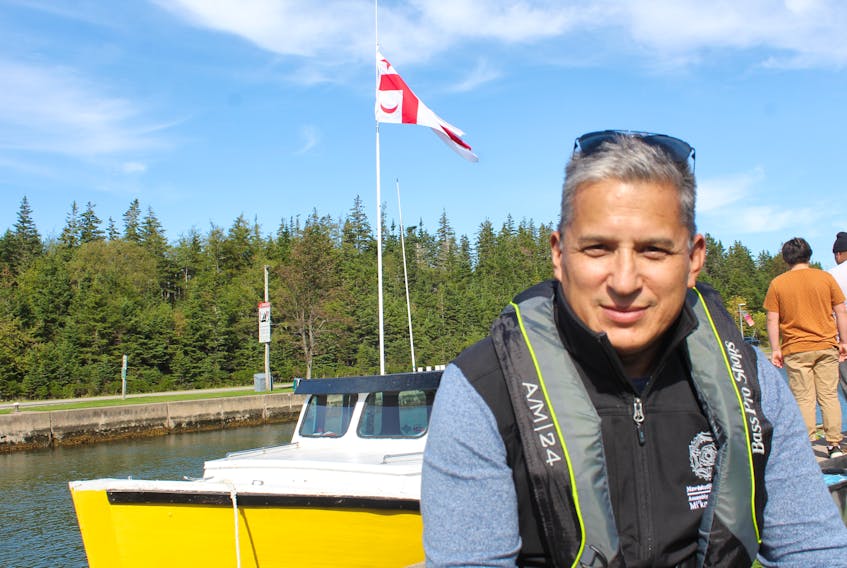SYDNEY, N.S. — Minister Bernadette Jordan says her plan to regulate moderate livelihood fisheries in Atlantic Canada is based on consultation with First Nations communities – a claim that Cape Breton chiefs flatly deny.
In a statement released Wednesday, Jordan says: “We have never stopped working with First Nations to reach agreement and implement their right to a moderate livelihood. That is why effective this season, we will introduce a new path for First Nations to fish in pursuit of a moderate livelihood, one that addresses much of the feedback we’ve heard over the past year.”
Chief Wilbert Marshall of Potlotek First Nation says he’s never been contacted by the department of fisheries and oceans.
“It’s like a dictatorship, and that’s why you can’t trust DFO and I hate to say that,” said Marshall. “We actually want to sit down and talk and work together, don’t just blindside us.”
Marshall says his community submitted their plan to Minister Jordan’s department over a month before they launched their moderate livelihood fishery last fall, but never got feedback.
He says he has no intention of working with the federal government’s new rules and his community will continue with its own fishing plan for the spring.
Under the government’s new regulations, moderate livelihood fisheries will only be permitted to operate within the established commercial fishing seasons and will be required to obtain licenses through DFO. Only fish harvested under these conditions can be sold legally.
Membertou First Nation announced its plans for a moderate livelihood fishery in late October 2020 and Chief Terry Paul says this latest announcement from DFO won’t affect those plans.
Paul says he’s disappointed with more of the same from the government.
“Donald Marshall Jr. was charged for fishing without a license. He was charged for fishing out of season. He won that case. So why is the minister going back to the old way of DFO operations, which does not work for us?" said Paul.

The 1999 Marshall decision by the Supreme Court recognized the rights of Mi’kmaq and Maliseet to earn a moderate livelihood from fishing.
A later amendment, Marshall II, clarified that the government may infringe on those rights only in cases that are “justified on the basis of conservation or other compelling and substantial public objectives.” It also requires that the government consult with First Nations on any regulation that limits their treaty rights.
Chief Paul says that consultation didn’t happen in his experience. He hopes the government will work with his community’s plan for a self-regulated fishery.
“There are rules in place, rules that address the issue, or the potential issue, of conservation and sustainability. That’s foremost for us before we go out fishing," said Paul. "And the research shows that the moderate livelihood fishery does not impact the stock of the sustainability of the fishery. It makes up a very small percentage of the total catch.”
Minister Jordan says that her department will work directly with communities to meet their licensing needs and that the number of licenses will not increase. Instead, a voluntary buy-back program will balance First Nations access and the protection of stocks.
“We can absolutely have a fishery that is peaceful, productive and prosperous, one that upholds the Marshall decisions and ensures First Nations are able to exercise their Treaty rights, in a way that is reflective of their Nation’s vision, needs and wishes,” she says.
According to the minister’s statement, her department will be enforcing the new regulations on the water and she says fishers will see more federal presence this spring, including fisheries officers and Canadian Coast Guard vessels.
"It’s like a dictatorship, and that’s why you can’t trust DFO and I hate to say that." — Potlotek Chief Wilbert Marshall
This worries Chief Marshall and Chief Paul.
Tensions between non-Indigenous commercial fishers and First Nations fishers led to heated confrontations, violence and vandalism on Nova Scotia's mainland in the fall of 2020 with the launch of Sipekne'katik First Nation's moderate livelihood fishery. When Mi’kmaq fishers put their traps in the water this spring, in spite of these new regulations, both chiefs see the potential for conflict.
“There will be more people on the water and someone is going to get hurt or killed or something. It shouldn’t come to that,” said Marshall.
Chief Paul echoes that sentiment: “I feel that all our livelihood fishermen have a target on their back ... I hate to think about it, but I feel that someone is going to get hurt.”
Paul says it’s not too late for the government to sit down with First Nations and collaborate on a solution instead of presenting them with unilateral decisions.
Eskasoni First Nation also plans to go ahead with its self-regulated fishery in the spring and Chief Leroy Denny says he’s looking into legal options with the Assembly of Nova Scotia Mi’kmaw Chiefs.
Ardelle Reynolds is an Indigenous affairs reporter with the Cape Breton Post.









